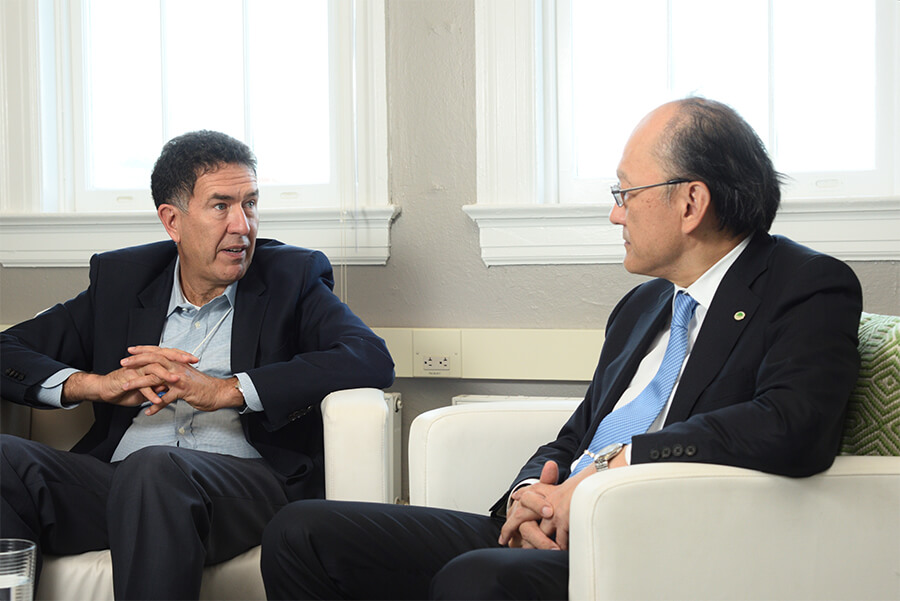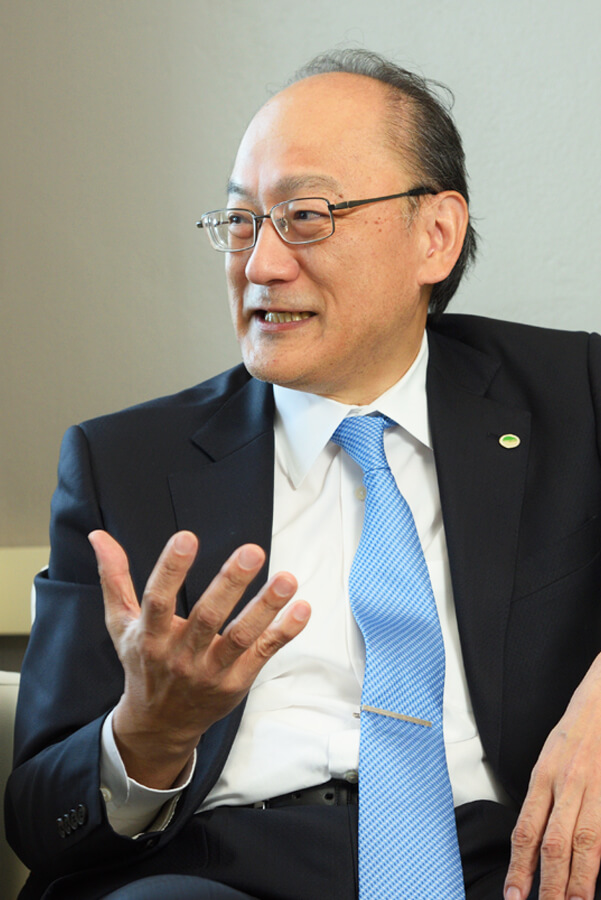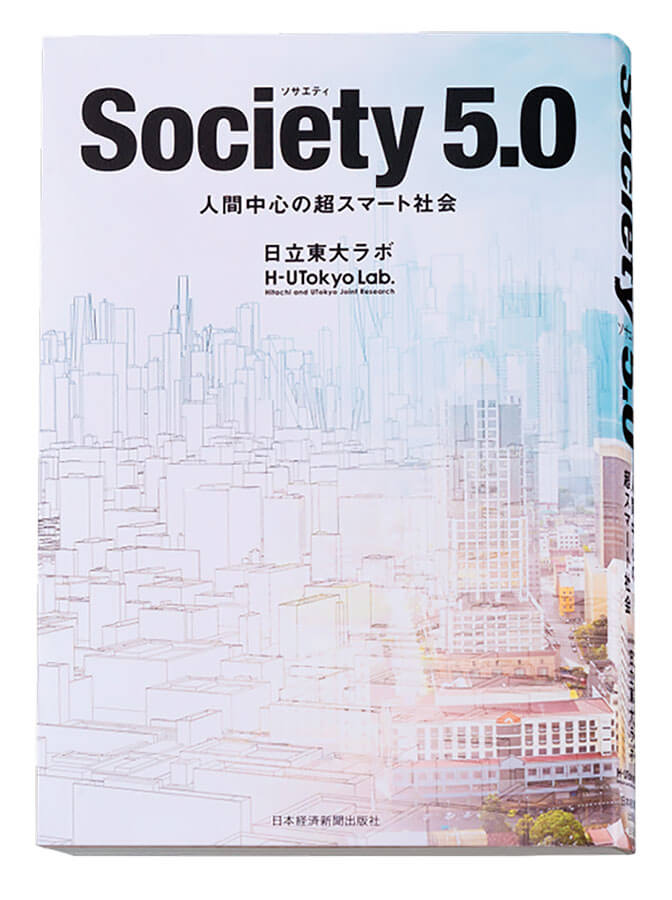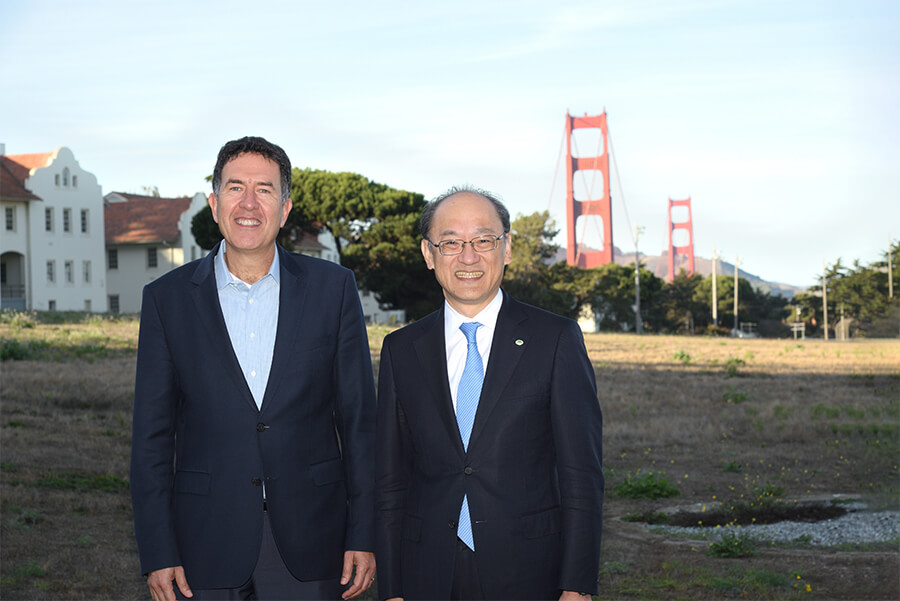
Discussion
The sophisticated use of data made possible by advances in digital technology is opening up new ways to overcome the challenges faced by companies and other parts of society.
In industry, a Fourth Industrial Revolution is underway at a global level that seeks to use technologies such as the Internet of Things and artificial intelligence to deliver a dramatic boost in productivity along with products and services offering high added value. While expectations of these increasingly sophisticated digital technologies continue to grow, many challenges remain when it comes to using these technologies to transform society. This poses the question: what sort of ideas and actions are needed to resolve these challenges and push ahead with digital technology?
In this article, two people share their views on this subject: Murat Sönmez, Managing Director, Head of the World Economic Forum Centre for the Fourth Industrial Revolution Network, an organization that is promoting the Fourth Industrial Revolution in countries around the world, and Norihiro Suzuki, Vice President and Executive Officer, CTO, and General Manager of Research & Development Group at Hitachi, Ltd.
 Murat Sönmez
Murat Sönmez
Managing Director, Head of the World Economic Forum Centre for the Fourth Industrial Revolution Network
BSc in Industrial Engineering, Bosphorus University, Istanbul, Turkey; MSc in Industrial Engineering and Operations Research, Virginia Tech. 1989–1993: Various roles from software engineering to product marketing management with Consilium, Inc. a provider of semiconductor factory automation software, Mountain View, California; 1994–1997: product management with Teknekron Software Systems, a provider of real-time financial trading systems. 1997–2014: Member of the founding team TIBCO Software, a real-time predictive data analytics software company, filling various positions including Head of Global Field Operations, General Manager, EMEA operations and Chief Marketing Officer. Since 2014: Member of the Managing Board of the World Economic Forum and currently the Head of the Forum's Centre for the Fourth Industrial Revolution in San Francisco, California.
SuzukiIt is said that we live in a time of uncertainty, where economic and social conditions are becoming more precarious and the future less clear. The digital revolution has brought major changes to the real world, with the idea of “data capitalism” becoming the new paradigm. At the same time, there is also growing concern in areas such as cyber-terrorism and “post-truth” populism (where politics is influenced by emotional appeal) fanned by social media. The widespread use of smartphones has increased the speed at which technology and services spread, and we can expect that the pace of everything will be affected as digital technologies such as artificial intelligence (AI) progress even further. Sönmez-san, what are your views on this era that we live in?
SönmezAs you mention, it may well be that the future is now nearly impossible to predict. The speed of technological advance has been faster than even the experts predicted. What we can do is put our heads together and ask ourselves how we can shape a better future. We also need to get ahead of this rapid pace of technological advance, something that requires collaboration between the private sector, the public sector, and civil society organizations.
SuzukiYes, the importance of collaboration between industry, government, and academia is becoming more important than ever before.
SönmezIf these changes that are happening much faster than we can comprehend, can have a positive impact on people and society, then I believe it presents an opportunity for progress. However, there is also cause for concern. You spoke earlier of “data capitalism,” raising the questions of who owns my data, what can be done with my data, and what benefits can be derived? These are the sort of questions that arise when we move in a new direction, and it is vital that we find ways to resolve them.
SuzukiI agree. Would you expand on the issues that arise out of digitalization?
SönmezUsing AI and big data, the potential exists to resolve a variety of different challenges such as the early treatment of diseases, higher agricultural yields, less congestion in cities, and lower energy consumption. On the other hand, the risk is that only a privileged few individuals will benefit from this technological progress. The gap that is already widening between the privileged few and the rest of the society will become even greater. To ensure that everyone enjoys the benefits of technology, we need to take action now through society-oriented approaches as well as through technology. The Society 5.0 concept being advocated by the Japanese government is one example of such a society-oriented approach. Society 5.0 is something that will come about through the ongoing Fourth Industrial Revolution, which in turn is made possible by people working together in various different ways. If Society 5.0 can be achieved, the benefits will spread to the rest of the world.
SuzukiWhat Society 5.0 is seeking to create is a human-centric society where digital technology enhances people’s quality of life. As you say, this is a society where the benefits of technology flow to all corners of life. Hitachi is pursuing Social Innovation Business to resolve challenges in society through business by working in collaborative creation with customers and partners. Social Innovation Business is working towards the achievement of the United Nations Sustainable Development Goals (SDGs) and Society 5.0. In doing so, Hitachi is putting into practice our Mission of “contributing to society through the development of superior, original technology and products.”
I believe that Hitachi’s Mission and the Society 5.0 concept have much in common with the thinking of the World Economic Forum (WEF) Centre for the Fourth Industrial Revolution (C4IR) that you head.
SönmezThat’s right. We believe that having people from different areas of society work together on resolving challenges will lead to a society in which everyone is able to enjoy the benefits.
 Norihiro Suzuki
Norihiro Suzuki
Vice President and Executive Officer, CTO, and General Manager of Research & Development Group, Hitachi, Ltd.
Suzuki joined the Central Research Laboratory of Hitachi, Ltd. in 1986 after completing his M.Eng. at the University of Tokyo. He began his research career in video signal processing, later leading research in Japan as well as the Americas. He became the first General Manager of the new Global Center for Social Innovation established to lead collaborative creation activities worldwide in April 2015. He took up his current position as head of the Research & Development Group in April 2016. Suzuki received his Ph.D. from the University of Tokyo in 1995, and was a visiting scholar at Columbia University, USA from 1995-96. He is a member of the IEEE, IEICE, and the Institute of Image Information and Television Engineers.
SuzukiWhile there are high hopes for advances in digital technology, there are also concerns. There are “lights” and “shadows” in all technology. The establishment of regulatory and legal frameworks is essential to overcome the shadows, or the negative elements. This is another reason Hitachi sees working with C4IR as important.
What factors do you see as important when overcoming the negative aspects of digital technology?
SönmezI believe that ethics play a key role. In AI in particular, I believe it is essential that algorithms do not omit ethics and that the key lies in ethical concepts being built into technology. At C4IR we have taken up the idea of the circuit breakers in electrical wiring as a metaphor for how we can embed these ethical rules into intelligent devices. That is, the device refuses to act if an unethical request comes in or arises internally.
SuzukiJapanese industry is also paying much attention to the question of AI and ethics.
SönmezThe problem lies in our inability to control AI algorithms. By incorporating the circuit breaker mechanism by means of an application programming interface, a governor can be imposed on devices that blocks them from unethical actions. It may be that insurance companies will be enthusiastic about seeing such mechanisms adopted. The practice is more likely to spread if the presence or otherwise of a circuit breaker changes insurance premiums. I would love to talk to Hitachi about how we can go about embedding such software-based circuit breakers.
SuzukiThe idea of a circuit breaker is good. The Japanese government is currently drafting rules and guidelines for AI, and Hitachi is participating in this work.
There are also those who worry about AI taking people’s jobs. It is my thought that while AI may be used for routine work, things like creativity will remain the preserve of human beings.
SönmezI would like to think so. Certainly, I can’t imagine two AIs having the conversation we are having right now. I think we just have to have confidence in humanity – if we can do that, I believe we can also find ways to direct the rapid advances currently taking place in AI in a more worthwhile direction. Just as the invention of the calculator freed people from having to do arithmetic, the use of high-level information processing services and utilities that are based on AI will allow us to spend our time and intellectual resources on things that have more value for us. This should also help give people back their self-confidence.
In this sense, I am optimistic about the future for AI and people.
SuzukiSo am I.
SönmezNevertheless, society as a whole needs to give serious thought to the nature of work and skills in this new world. Also, going back to what I spoke of earlier, we also need to pay close attention to whether or not AIs are designed to have positive benefits. As I said at the beginning, this is because predicting the future is so difficult, with the progress of technology having outstripped the predictions of experts.
SuzukiYes. From that perspective, we are engaging with experts in biology and the humanities at Kyoto University to deepen the discussion on new values and ethics that are predicated on an unpredictable future.

The global network of Centres for the Fourth Industrial Revolution brings together governments, leading companies, civil society, and experts from around the world to co-design and pilot innovative approaches to the policy and governance of technology. Its vision is to shape the development and use of technology in ways that maximize the benefits and minimize the risks. The Network will develop, implement and scale agile and human-centered pilot projects that can be adopted by policy-makers, legislators, and regulators worldwide.
The Centre for the Fourth Industrial Revolution Japan, meanwhile, which was established in July 2018, focuses primarily on data policy, mobility, and healthcare, working with other centers in India, China, and elsewhere to study and promote the necessary regulation and ways of using technology.
 Staff at C4IR. Numerous people are seconded to work at C4IR from Hitachi and other corporations.
Staff at C4IR. Numerous people are seconded to work at C4IR from Hitachi and other corporations.
 This simple building that once housed American soldiers is now the center’s office.
This simple building that once housed American soldiers is now the center’s office.
 This workshop room is a venue for open and inclusive discussion between people from companies around the world.
This workshop room is a venue for open and inclusive discussion between people from companies around the world.
SuzukiI believe it is important to brighten the “light” that technology can bring.
SönmezA statistic from India is that state hospitals there have only one doctor for every 12,000 people. There is no way they can deliver proper health care under those conditions. Using the latest digital technologies such as AI, however, it is possible to provide individual patients with faster access to a better quality of healthcare. While there may be negatives here too, I believe that the positives will outweigh them.
SuzukiIs AI the main topic for C4IR’s activities in India?
SönmezIt is one of a number of topics. Our focus is on AI and blockchains at the national level and on the use of data in agriculture at a regional level. India has been experiencing irregular monsoon cycles due to the effects of climate change, making it difficult for farmers to know when to plant their crops. Because farms in India are so small, harvest failures can have a serious impact on the lives of farmers. As around 500 million people in India make their living from agriculture, decreasing harvest sizes due to climate change are a serious social problem.
C4IR is engaged in projects that use AI and the Internet of Things (IoT) to address this challenge in Maharashtra State, where approximately 14 million people work in agriculture, and in Andhra Pradesh State. This includes deploying smart sensors on farmland to collect data on rainfall, sunshine, and soil, and using machine learning techniques to analyze the data and predict when best to plant. We are also working on precision agriculture using drones and sensors for things like eliminating waste by optimizing the application of fertilizer and water, and for monitoring yields. If a harvest is smaller than anticipated, the government can make proactive use of insurance programs to provide effective assistance.
SuzukiSmart agriculture is one of the key areas of Society 5.0. Japan has been experiencing greater effects from climate change, including higher levels of typhoon damage. The environment in which agriculture operates is also becoming more difficult as the aging of the population brings workforce shortages, creating a need for the use of data to improve productivity.
SönmezYes. What we are doing in India could be described as smart agriculture. The importance of putting data to good use is rising in many different areas.
SuzukiData usage also has its “lights” and “shadows.”
SönmezThe problem is that certain companies are establishing a monopoly on data. The risk if our data becomes something that those companies can monetize is that the benefits to society as a whole will be lost. We have a particular vision with regard to this problem: if we keep the data close to where it is collected, then we can place restrictions on the use of the data beyond its intended purpose. Someone, such as the government or the data administrators at the company concerned, can identify things like who owns the data and specify the amount of data to be made available for use by third parties and which data is able to be used. If these conditions of use are attached to the data itself then the users can also check for themselves.
If cancer researchers, for example, are seeking genetic data, they can put out a request to that effect on the network, in response to which the data (with usage conditions already in place) can make its existence known. Such a mechanism makes data available to users without delay while still allowing the owner to restrict use of the data for other than its intended purpose. If the consent of the owner is needed each time data is used, then we can create a protocol for the exchange of data between companies. This could also include asking for money in exchange for access to the data.
The question then is: how do you value data? Here, blockchain tokens can be useful. Companies can issue tokens and exchange them for data. If an exchange is established on which these tokens can be publicly traded, this trading will serve to put a value on the data.
If such a system could be put in place it would provide a solution to the important problem of data ownership. This has merits in terms of both technology and ethics, freeing up the flow of data within the country. If such a system were then extended to operate between two countries, Japan and India, say, it would enable the establishment of a cross-border infrastructure for data exchange. When applications such as agriculture have a requirement for large datasets, such datasets can be collated rapidly thereby shortening the time for solution development. While all this is still at the concept stage, it has the potential to deliver benefits, and the Indian government has responded favorably to the idea.
How do you view this concept from your private sector perspective?
SuzukiData exchange is an important issue, and I believe it is a market with a promising future. The question, however, is whether it will be the government or other public agencies who regulate the protection of data? If so, the problem of data silos will be of concern to the private sector. While the Japanese government has a plan to establish a cross-industry data exchange in 2020 that will collect big data held by companies or government agencies, and make it available to all, there are still a lot of issues that need to be solved, including how coordination will be achieved and what systems will govern the exchange of data.
SönmezAs a key institution involved in promoting the Fourth Industrial Revolution, we at C4IR are able to facilitate dialog between government and companies from different industries and assist with the establishment of platforms for putting data to use. One example you might consider is the use of trials in which a regulatory sandbox is created to loosen the rules within a particular region or period of time, with the results of this being used to inform the study of frameworks for data use. While gaining people’s understanding and consent before their data can be used is clearly essential, I believe that such consent will be forthcoming if the use of data can be controlled based on the concept I talked about earlier. There is an urgent need for guidelines to be put in place. I would love for Japan to be the pioneer in this area.
SuzukiI believe that the use of data holds the key to future progress for Hitachi’s business as well. We have launched Lumada as a solution that accelerates digital innovation by shining a light on customer data to unlock its value. The name Lumada is derived from the two words — “illuminate” and “data.” Using Lumada, it is possible to accelerate the sequence of steps from visualizing the challenges faced by customers by analyzing the data, establishing hypotheses on how to resolve those challenges, prototyping a solution, verifying and assessing the value, through to delivery.
Increasing uncertainty is making the challenges faced by companies and other parts of society larger and more complex, such that addressing them independently will no longer be viable. As you noted earlier, a sense of urgency is needed if we are to overcome these challenges in this age of rapid change. By using Lumada to strengthen collaborative creation with customers, what Hitachi is seeking to do is to find effective solutions for the challenges of those customers and society.
SönmezYes. When it comes to getting value out of data, attention must also be paid to those outcomes that cannot be measured in numbers, meaning a reappraisal of what we mean by “value.”
SuzukiTo create value, it is also important to share a common vision. Along with a methodology to develop a shared vision with customers, Hitachi has also published visions, for example of a sharing economy or what role AI might play as the population ages in the form of videos (see 1). This is a useful tool for sharing visions with customers and the public.
Figure 1—Video showing future practical scenarios
Focusing on a specific area such as the home or energy, video is an easy-to-understand way of presenting the challenges that people may encounter in the future, and ways of overcoming them.
Figure 2—Human-centric Super Smart Society (Nikkei Publishing, Inc.) As well as drawing on knowledge acquired by Hitachi’s laboratory at the University of Tokyo to offer the public a broad view of the vision for Society 5.0, its practices and technology development, the book also presents new approaches to overcoming the challenges facing modern cities.
As well as drawing on knowledge acquired by Hitachi’s laboratory at the University of Tokyo to offer the public a broad view of the vision for Society 5.0, its practices and technology development, the book also presents new approaches to overcoming the challenges facing modern cities.
SönmezOvercoming societal challenges is not something that can be accomplished solely by companies or government, with civil society, too, needing to get involved. This is an area where such videos could really help. There is a lot of need for that and videos are easy to get out there.
In Japan and other countries, as well as in India, whether or not civil society can become actively engaged is key to realizing a vision for the future. If C4IR and Hitachi can also work together on this task of presenting a vision, I believe that it will help countries around the world, not just Japan.
SuzukiYes, let’s work together. With regard to societal challenges, Japan is said to the first among many countries in the world to face the challenges arising from an aging population and energy issues. At the same time, Japan is blessed with capability and expertise in terms of collecting real-world data from work environments such as industrial plants or control rooms to identify the issues, and to find solutions. We are actively working with experts from various fields including economics, social sciences, and humanities, in areas such as energy systems, urban development, and data platforms, to help resolve the challenges faced by society.
We have also established laboratories at the University of Tokyo, Kyoto University, and Hokkaido University to engage in joint research under an industry-academia co-creation scheme. They are creating shared visions for Society 5.0, and generating ideas and innovations to overcome challenges. The Hitachi University of Tokyo Laboratory recently published a book, “Society 5.0 — a human-centric Super Smart Society” (see 2). Unfortunately, it is currently only available in Japanese.
SönmezThen I will have to hurry up and learn Japanese. I could also try using the digital technology of machine translation.
SuzukiI have high hopes for the work carried out by C4IR, including the establishment of the framework for data use that we talked about earlier. One of the things I like about C4IR is that it is a “do-tank.” It is a think tank that is taking practical steps to bring about digital transformation. While many standardization bodies exist, C4IR is an organization at the forefront of achieving tangible outcomes, with a focus on realizing a digital society.
Collaborative creation by Hitachi and C4IR could serve as a driving force to present a vision to the world and expedite practical actions. We are focusing on cross-border data flows and blockchain to accelerate the Fourth Industrial Revolution, and hope to promote such initiatives around the world as well as in Japan.
SönmezIt would be our privilege and pleasure to help with the social innovation in which Hitachi is engaged. I believe that the IoT is also an area you are focusing on. However, I think that challenges remain when it comes to putting the IoT into practice. One example is the government of Brazil, with whom C4IR has a partnership. Although they have invested a lot of money in the IoT, many of the projects do not get past the pilot stage, meaning they are not picked up by the government and do not contribute to wider society. I would like to hear more about what Hitachi is doing when it comes to the public and private sectors working together on the IoT.
SuzukiTo realize the creation of a human-centric society that the Japanese government is targeting under the concept of Society 5.0, we will need to rethink all aspects of the environment in which we live. The Hitachi laboratory at the University of Tokyo is working on “Habitat Innovation” to generate new value by connecting data between people and their living environment using IoT. I believe that Hitachi’s experience and expertise with infrastructure and information systems will prove useful to this value creation process. While the use of data that is closely tied to people’s daily lives will require consent and other support structures, we will work toward the realization of Society 5.0 by combining this data with Hitachi’s strengths in operational technology (OT) and IT and with our social infrastructure products.
SönmezIn a way, what you are describing is a need for a new operating system for governments and for society. I think the key is to involve civil society in the co-design of institutions and systems. If we can pull it off—and I am confident we can—we can look forward to an inclusive future, an equitable future, and a very promising future. A future in which some of the challenges we are seeing today will be addressed much, much faster.
SuzukiI agree. While achieving this poses the sorts of challenges we have been talking about, I hope we can work together to overcome them.
In April of this year (2019), we will open a new innovation center for co-creation under the concept of “Collaboration Forest” at the Hitachi Central Research Laboratory. We will be increasing our efforts to promote the Fourth Industrial Revolution from this base.
SönmezI look forward to it. I believe that Japan has the potential to become a role model for the Fourth Industrial Revolution.
SuzukiWe will strive to remain at the forefront. Thank you for your time today.
